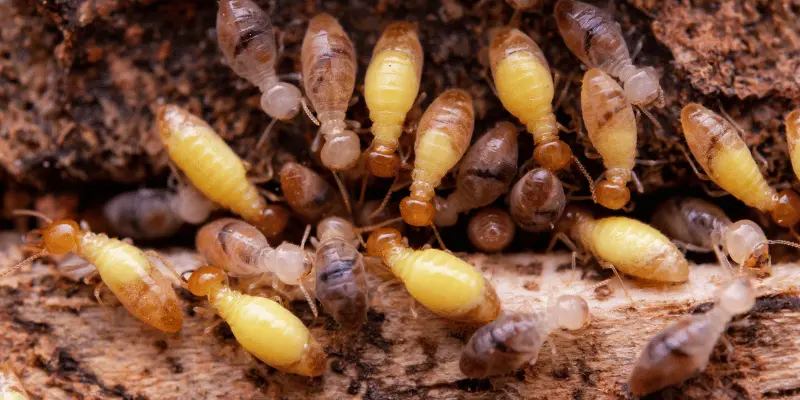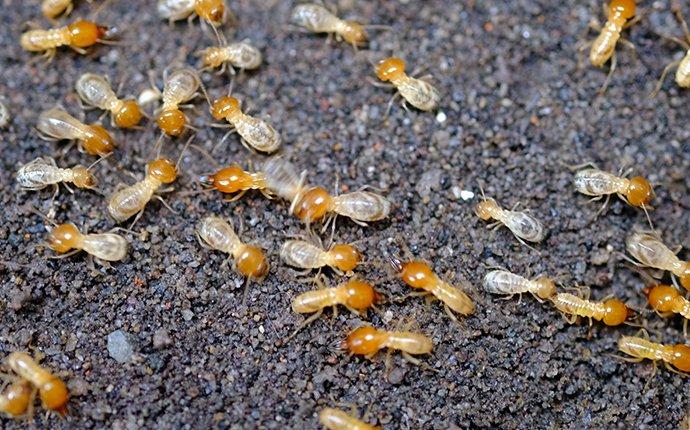Specialist Termite Control Services: Secure Your Home from Termite Damage
Wiki Article
Ecological Influence of Bug Control: Balancing Effectiveness With Sustainability
The ecological influence of insect control is an essential problem that requires a delicate equilibrium between attaining efficiency in managing parasites and ensuring sustainability of our ecological communities. As we aim to safeguard our crops, homes, and health and wellness from the threats postured by insects, the approaches we employ can inadvertently hurt the setting. From making use of harmful chemicals that permeate into our soil and water to the unintended repercussions on non-target varieties, the repercussions of traditional insect control techniques are far-reaching. There are emerging approaches that offer hope for a much more lasting strategy to pest management. These services not only goal to deal with the instant bug troubles however additionally consider the lasting health and wellness of our earth.Dangerous Chemicals in Bug Control
The application of dangerous chemicals in insect control postures substantial environmental and health and wellness risks that warrant mindful consideration and reduction strategies. Chemicals, herbicides, and pesticides are generally made use of to eliminate pests, but their widespread application can bring about unplanned repercussions. These chemicals can contaminate dirt, water sources, and the air, impacting not only the targeted insects however also useful pests, wild animals, and humans.
To address these risks, incorporated insect administration (IPM) methods are being promoted as an extra sustainable choice. IPM includes a mix of techniques such as biological control, environment adjustment, and the targeted use pesticides as a last resource (ant control statesville nc). By taking on an all natural method to pest control, we can lessen the environmental and health influences related to harmful chemicals while efficiently managing pest populations
Influence On Non-Target Species
Thinking about the unexpected effects of insect control methods, the influence on non-target varieties is a vital facet that requires detailed examination. While parasite control actions intend to target certain parasites, various other organisms in the environment may be accidentally affected. Non-target species, consisting of valuable bugs, birds, animals, and also plants, can suffer direct or indirect harm from pesticide applications or biological control methods.Pesticides developed to combat a certain insect pest might damage pollinators like or natural predators such as ladybugs. Biological control agents, if not species-specific, can pose threats to unplanned targets, interrupting the ecological balance.
To minimize the influence on non-target types, integrated parasite monitoring (IPM) strategies that highlight a holistic technique to pest control are recommended. These approaches focus on using eco pleasant techniques, lessening harm to beneficial organisms while successfully handling pest populations. Performing complete risk assessments and keeping an eye on the outcomes of bug control initiatives are necessary steps in securing non-target varieties and advertising overall ecosystem health.
Soil and Water Contamination
Unintended environmental consequences of insect control methods prolong beyond affecting non-target types, with substantial implications for soil and water contamination. Chemicals, herbicides, and chemical fertilizers made use of in pest control can leach right into the soil and infect groundwater, posturing a danger to both aquatic and earthbound ecosystems. Soil contamination can disrupt the equilibrium of microbes necessary for vitamins and mineral cycling and plant growth, bring about lowered dirt fertility and efficiency. In addition, these chemicals can continue the atmosphere for extensive periods, collecting in the soil and possibly getting in the food web.Water contamination is an additional crucial problem connected with bug control techniques. To minimize dirt and water contamination from bug control activities, incorporated insect administration strategies that prioritize sustainability and minimize chemical inputs are vital.
Air Pollution From Chemical Usage
Direct exposure to airborne pesticides during farming applications positions a substantial concern for air pollution control measures. In addition, chemical drift, where pesticides are carried by the wind to unintended locations, can lead to the contamination of close-by environments and water bodies.
Strategies for Sustainable Bug Control
In the realm of farming practices, executing sustainable pest control strategies is paramount for maintaining environmental balance and safeguarding plant yields. Lasting insect control highlights the usage of eco-friendly approaches to take care of pest populations effectively while decreasing injury to non-target organisms and environments. Integrated Insect Monitoring (IPM) is a widely embraced approach that combines organic, cultural, physical, and chemical control methods to attain long-term bug management solutions.Plant turning and diversification are additionally reliable strategies to interrupt pest life cycles and develop less beneficial problems for bugs to flourish. Eventually, by incorporating these sustainable pest control strategies, farmers can attain a balance between pest administration performance and environmental stewardship.
Verdict
Finally, the environmental influence of pest control methods must be very carefully thought about to balance performance with sustainability. Harmful chemicals utilized in pest control can result in dirt and water contamination, air contamination, and injury non-target types - ant control. It is important to execute lasting pest control techniques to lessen these adverse effects on the setting and advertise a healthier ecological community for future generationsBy embracing an all natural approach to pest control, we can minimize the ecological and health and wellness influences associated with hazardous chemicals while successfully taking care of pest populaces.

To minimize the air contamination created by pesticide usage, it is essential to take on integrated parasite monitoring strategies that prioritize the use of non-chemical parasite control approaches, such as plant turning, all-natural killers, and immune crop selections. Sustainable bug control emphasizes the usage of eco pleasant techniques to take care of insect populations successfully while decreasing injury to non-target microorganisms and environments. Integrated Bug Monitoring (IPM) is a widely embraced approach that incorporates biological, social, physical, and chemical control approaches to attain long-lasting parasite management options.
Report this wiki page